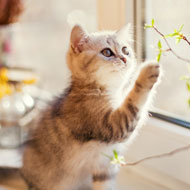Female cats ‘more likely to use right paw’

“There is some suggestion that limb preference might be a useful indicator of vulnerability to stress," said Dr Deborah Wells.
A new study by Queen’s University Belfast suggests female cats may be more likely to use their right paw than males.
Researchers from the School of Psychology recruited 44 cats for the study and asked their owners to collect ‘spontaneous’ data on which paw their cats used for certain tasks. A ‘forced’ test was also carried out where cats had to reach for food inside a three-tier feeding tower.
Previous research on limb preferences in animals have focused solely on ‘forced’ experimental challenges. In this study, cats were also studied in their own homes and information was gathered as they went about their everyday lives.
According to findings published in the journal Animal Behaviour, the majority of cats showed a paw preference when reaching for food (73 per cent), going downstairs (70 per cent) and stepping over objects (66 per cent). Their preference for right or left was consistent for the majority of tasks, whether spontaneous or forced.
In all cases, male cats showed a significant preference for their left paw, while females were more likely to use their right paw. The cats did not appear to have a side preference while sleeping, however.
Further research is needed to find out why there is a gender preference, but Dr Deborah Wells believes it could be down to hormones.
The findings could also help cat owners to understand how their pets deal with stress.
“There is some suggestion that limb preference might be a useful indicator of vulnerability to stress,” Dr Wells added. “Ambilateral animals with no preference for one side or the other, and those that are more inclined to left-limb dominance, for example, seem more flighty and susceptible to poor welfare than those who lean more heavily towards right limb use.”
She added: “We have just discovered that left-limbed dogs, for example, are more pessimistic in their outlook that right -limbed dogs.”



 The Veterinary Medicines Directorate (VMD) is inviting applications from veterinary students to attend a one-week extramural studies (EMS) placement in July 2026.
The Veterinary Medicines Directorate (VMD) is inviting applications from veterinary students to attend a one-week extramural studies (EMS) placement in July 2026.